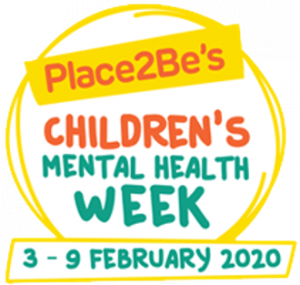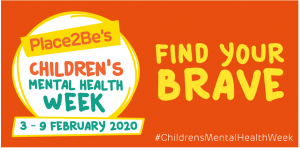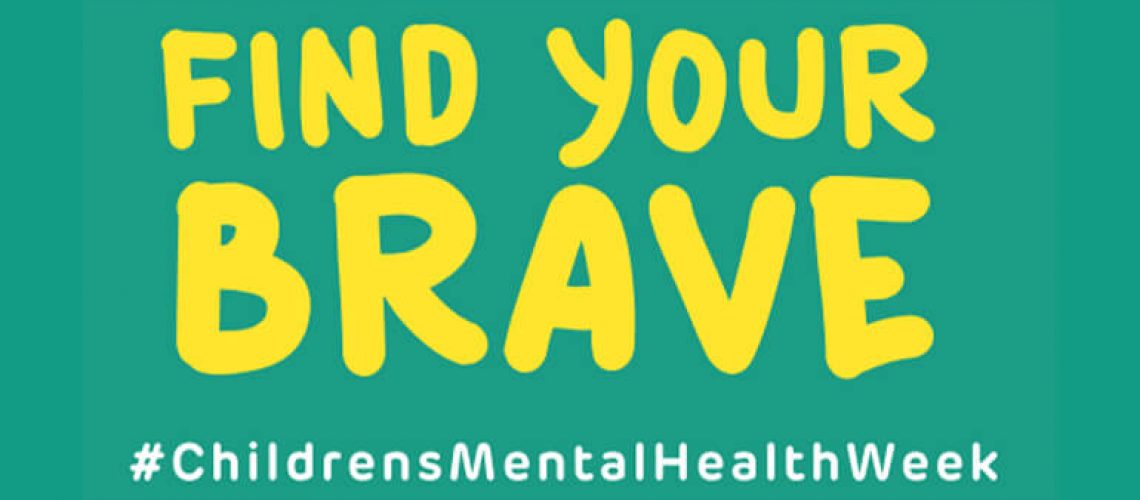Place2Be’s Children’s Mental Health Week takes place this week and aims to shine a spotlight on the importance of mental well-being amongst children and young people. This year’s theme is ‘Find Your Brave’ and focuses on mental resilience and support.

Mental Health Crisis
The prevalence of youth mental health issues is well-documented, affecting a staggering 1 in 8 children, approximately 3 children in every standard-size UK classroom (Mental Health Foundation).
Describing the current status of children’s mental health as a crisis is in no way hyperbolic; the relevant statistics paint a concerning picture. According to the Children’s Society, children’s happiness with life is at its lowest in a decade, with the number of children admitted to A&E departments with mental health issues rising by 330% since 2010. Alongside this, there has been a 48% rise in anxiety and depression among British children in the past 15 years. More than half of all adults with mental health issues were diagnosed in childhood by the age of 14; evidence of how vital early intervention and sufficient youth mental health support is.
Children today have to contend with a wide range of anxiety and stress inducing elements such as pervasive peer pressure, increasingly competitive education systems and severe body image concerns. ‘Invisible harms’ and broader world issues such as climate change and a more global news cycle are also escalating the child mental health crisis, leading to feelings of hopelessness and an anxiety which children often find difficult to pinpoint and explain. Over-use of social media is an additional new pressure for children to contend with, as it can lead to constant over-stimulation and distractions. Recent research suggests that more than 23% of young people and children have a dysfunctional relationship with their smartphones, and that this appears to be associated with poorer mental health (BMC Psychiatry).
It is only in recent years that mental health has started to be considered as equal in importance to physical health. As outlined by Kate Middleton as part of the Heads Together initiative;
“A child’s mental health is just as important as their physical health and deserves the same quality of support. No one would feel embarrassed about seeking help for a child is they broke their arm – and we really should be equally ready to support a child coping with emotional difficulties.”
Encouraging parity between both physical and mental health is a key element in ensuring the wellbeing of children and is the foundation upon which sustainable and comprehensive support can be developed.
‘Finding Your Brave’ & Supporting Children’s Mental Health
This Children’s Mental Health week, Place2Be want to place emphasis on children’s coping strategies and how we can help them recognise when they might need support whilst ‘Finding Their Brave’.
Children need to know that it takes considerable bravery for them to tell someone that they are struggling or feel vulnerable. That it is brave of them to share if they are worried or feel that they need to ask for help. By ‘Finding Their Brave’ each child can grow their confidence and self-esteem, in the knowledge that they have sufficient coping strategies.
In order to help support youth mental health, it is vital to engage in open and honest conversations with children. Explore what bravery and mental wellbeing means to them and how challenging circumstances can be overcome. Talk about how bravery isn’t about coping alone or holding things in; it is about finding positive ways to deal with physical and mental challenges. Acknowledge when children ‘Find their Brave’ – when they’ve persevered with a new skill, have attempted a task that was outside of their comfort zone or when they have shown vulnerability or compassion. Reinforce that sometimes being brave and having good mental health is about saying no, asking others for help or sharing worries. If you share your own stories of when you have been courageous and open about your mental wellbeing it can show children that life is often all about taking small brave steps every day.
Movement and Mental Health
One of the best steps to take is to encourage children to participate in a regular sport as physical activity can play a key part in supporting young people’s mental health. The British Medical Journal recently found an association between sedentary behaviour amongst children and poorer mental health. Conversely, involvement with routine physical activity was shown to have many benefits including; improved cognitive performance, better academic achievement, and increased self-esteem and reduced anxiety. In a global study, it showed that children who participated in regular sport had fewer emotional difficulties, inattention and peer relationship problems; and more pro-social behaviours spread equally amongst between boys and girls. Research has also shown that team sports are particularly beneficial and associated with improved health outcomes, due to the social nature of participation and the feeling of community and belonging that it can lead to. At The Bugs Group, we believe that sport and physical activity is critical in teaching children some of the skills to cope with the difficulties that they may encounter.
Many sports, such as Yoga can help children quiet their minds and focus on their tasks. In addition, it can give them strategies on how to regulate their emotions and develop a more positive outlook. By using The Bugs Group’s unique narrative-based approach to sports sessions, children can enjoy activities that benefit their mental health, whilst having fun. All of our coaches encourage creativity, exploration and adventure throughout the sessions and create a safe and accepting environment for children to flourish. In addition, our bespoke Mindfulness programme teaches children mindfulness through a combination of yoga, breathing, visualisation and relaxation techniques. Meditation in our sessions also shows children how to cope with challenging thoughts and emotions and focus on the here and now.
Contending with the current status of children’s mental health is clearly an extensive challenge – wide in scope and complex in character. Combating these challenges requires new attitudes alongside a cultural shift, sufficient support services and a considered and holistic approach. But by listening to children and encouraging them to share their mental health journey, all of us can help shift the stigma surrounding this issue. Through awareness of the benefits of sport to children’s physical and mental health, we hope to help children to ‘Find Their Brave’ in all of our sessions and to ensure that each and every child reaches their full potential.


